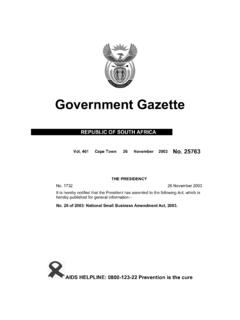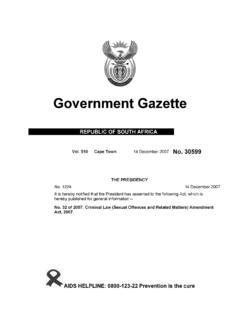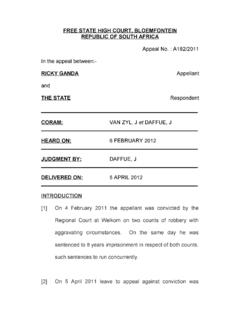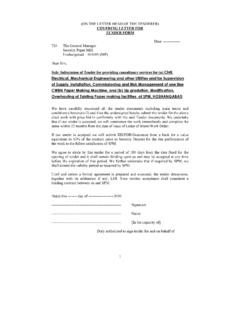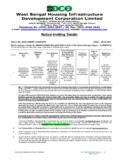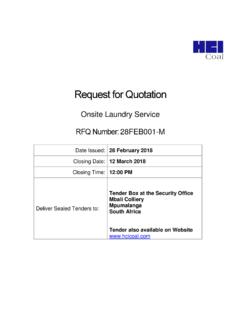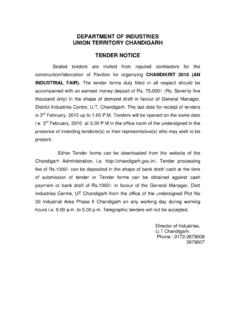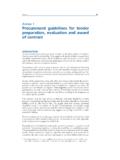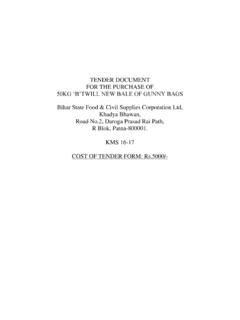Transcription of JUDGMENT - SAFLII
1 THE SUPREME COURT OF APPEALREPUBLIC OF SOUTH AFRICA JUDGMENT Case No: 358/08 ESKOM HOLDINGS LIMITED First AppellantKWANDA FERRO-ALLOY AFRICAN RESOURCES (PTY) LTD Second AppellantandTHE NEW RECLAMATION GROUP (PTY) LTD RespondentNeutral citation: Eskom Holdings Ltd v The New Reclamation Group (358/08) [2009] ZASCA 8 (13 March 2009).Coram:HARMS DP, CLOETE, PONNAN, SNYDERS JJA et LEACH AJA Heard:24 FEBRUARY 2009 Delivered:13 MARCH 2009 Summary:Promotion of Administrative Justice Act 3 of 2000: review of award of tender by organ of State; principles applicable and appropriate remedy, appeal from: High Court, Johannesburg (Blieden J sitting as court of first instance).The appeal is dismissed. The appellants are ordered to pay the respondent's costs of appeal jointly and severally, the one paying, the other to be JA (HARMS DP, PONNAN, SNYDERS JJA et LEACH AJA concurring):[1]In mid-2007 the first appellant, Eskom Holdings Limited, awarded a tender to the second appellant, Kwanda Ferro-Alloy African Resources (Pty) Ltd.
2 One of the unsuccessful tenderers was the respondent, The New Reclamation Group (Pty) Ltd ('NRG'). At the suit of NRG the court a quo (Blieden J in the Johannesburg High Court) set the award of the tender aside and ordered Eskom and Kwanda to pay NRG's costs jointly and severally. Eskom and Kwanda now appeal with the leave of the court a quo.[2]It is necessary to deal with the facts in a little detail. During March 2007 Eskom, by way of a request for quotation ('RFQ'), formally invited tenders for the collection and disposal of non-ferrous scrap metals ('material'). The RFQ provided that if a tender was accepted, a contract would come into existence for two years for the removal, as and when required by Eskom, of material (which was owned by Eskom) from various sites in South Africa; the processing of such material; and the payment to Eskom of a price for the quantity of material recovered and processed.
3 The following clauses of the RFQ are relevant for present purposes:' to a prospective tenderer meeting all the requirements set out herein as well as the general principles governing the award of the proposed tender , Eskom may in its sole and absolute discretion agree to dispose of such material in their existing condition, as set out in the agreement.'' has the sole and exclusive right to determine to which tenderer the contract will be awarded and in this regard Eskom may in its sole and absolute discretion decide not to award any contract and to invite quotations and tenders afresh. It is specifically recorded that a proposed tenderer will merely make an offer to Eskom for the purchase of the material and that a binding agreement of any nature 2whatsoever will only come into existence once a proposed tenderer has been informed in writing of the fact that he is awarded the tender .
4 '' tenderers are obliged to prove in the sole and absolute discretion of Eskom during the evaluation period (being May 2007) that they can comply with the requirements of this enquiry and once a contract has been awarded, to comply with all the terms of the agreement fully and punctually.'The position was therefore that Eskom had a discretion to award the agreement to any tenderer, or not at all; but it could only do so if the tenderer met all the requirements of the tender ; and the decision whether a tenderer could comply with the requirements of the tender , was also a decision to be made in the discretion of Eskom. What is important for present purposes is that included in the RFQ was a 'Financial Evaluation Form' which required signature on behalf of the tenderer and which read:'In order that ESKOM can determine that it is placing business with viable companies, ESKOM determines minimum requirements to satisfy itself that it is justified in entering into an AGREEMENT with such companies.
5 Accordingly, it is in the interest of the tenderer and strictly required by ESKOM, that the tenderer submits audited financial statements for the last two years. This information will be handled with the strictest confidence.'[3]Kwanda and NRG both submitted tenders. In a covering letter attached by Kwanda to its tender , it said that it:'[I]s a company formed in partnership with Rappa Holdings to target a niche of steel and foundry customers in Africa which are perceived as risky due to their size, geographical positioning, etc, Rappa Holdings is a holding company of Knightsbridge Copper and Cobalt, Waste Product Utilisation and Three Marias Mines. Rappa Holdings has 50% share in Kwanda and the balance of the 50% is owned by the Luthuli/Buckley Trust.'Rappa Holdings provided a balance sheet of the 'group' which comprised five major subsidiaries, including Kwanda.
6 [4]The tenders were evaluated and adjudicated upon in three stages. The outcome of the first stage was that four tenderers , including Kwanda and NRG, were shortlisted. Thereafter, as part of the second stage, the tenders were evaluated by various Eskom bodies, including the Corporate 3 Management Accounting Department. The report of this latter body in relation to Kwanda's tender , began with the statement:'Please note that this financial analysis was performed solely for the purpose of deciding whether RAPPA HOLDINGS (PTY) LTD is sound enough financially to be awarded a contract of R29 million for the collection of non-ferrous scrap metal, over a period of two years ..'and the author concluded:'In my opinion, RAPPA HOLDINGS (PTY) LTD is sound enough financially to be awarded a contract of R29 million for the collection of non-ferrous scrap metal, over a period of two years.
7 'The report contained no reference whatever to Kwanda.[5]At the third and final stage a report was put before the Corporate Division R35M tender Committee. The report said inter alia:'All short listed companies were found to be financially ..Kwanda Ferro-Alloy African Resources is sufficiently financially sound to be awarded the contract for the collection and disposal of non-ferrous metal.'The report further contained a recommendation that the contract be awarded to Kwanda because it:'[S]ubmitted the most favourable offer that is technically, financially and commercially acceptable of the eight offers received.'NRG was still in contention at that stage of the process indeed, the R35M tender Committee initially at its meeting on 1 June 2007 pointed out that the price offered by Kwanda, which exceeded NRG's tender by some R2,8 million, might be outweighed by the better ratings scored by NRG in relation to security and site evaluation.
8 However, the committee ultimately approved the award of the contract to Kwanda for the period 11 June 2007 to 31 May 2009.[6]It is quite apparent from what I have said about Kwanda's tender that Kwanda did not itself have the financial resources to perform the work and that the tender was awarded to it on the basis of the financial position of the Rappa Group. All that Eskom knew about the relationship between the two was that Rappa Holdings was a 50 per cent shareholder in Kwanda and that, according to Kwanda, it had a 'partnership' with Rappa Holdings. The former 4relationship did not of itself oblige Rappa to assist Kwanda (indeed, individuals frequently use the vehicle of a company in which they are shareholders to avoid personal liability and to enable them to liquidate the company, should its business prove unprofitable).
9 And there was nothing to show that the latter relationship imposed any such obligation on Rappa Holdings or its subsidiaries in the Rappa Group either. Not even Kwanda said it did. Where the financial ability of a tenderer to perform the contract for which it tenders is a prime consideration in the award of the tender , as will usually be the case (and was here), then the award of a tender based on the financial ability of a third party to perform the tender is illogical unless there is some obligation on the third party to provide the necessary financial assistance to the tenderer. It is not in dispute that Eskom is an organ of State and that the award of the tender constituted administrative action reviewable in terms of the provisions of the Promotion of Administrative Justice Act (PAJA).
10 1 In the words of that Act, Eskom, in awarding the tender to Kwanda, took into account irrelevant considerations2 (the financial ability of the Rappa Group to perform the contract) and it did not consider relevant considerations3 (the financial ability of Kwanda to perform the contract); and the award of the tender was not rationally connected to the information before [7]It was submitted on behalf of Eskom that it was entitled in the exercise of its discretion and in the furtherance of its Black Economic Empowerment policy to take risks in the award of a tender , provided it gave proper consideration to the matter. The short answer to this submission is that there is nothing in the affidavits or the documents annexed to them to show that Eskom appreciated that it was taking any risk. The contrary is the position.

